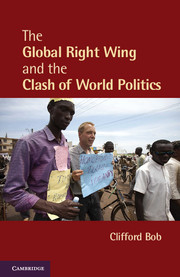2 - Making and Unmaking Policy
Published online by Cambridge University Press: 05 June 2012
Summary
To reach their goals, activists work not only to persuade decision makers but also to defeat powerful networks promoting contrary aims. These battles and their strategic anticipation influence whether a policy will be adopted. They affect where and how those fights will be fought. They shape mobilization and the very identity of opposing networks.
This spotlight on conflict does not simply supplement current ways of understanding advocacy. Rather, in explaining how policy networks operate, I place contention at the heart of analysis – as it is at the nub of politics. I devote equal attention to equally powerful contenders whatever their ideology, and I restore the true nature of their clashes. As Craig Murphy has written, these involve “struggles over wealth, power, and knowledge.” Or, in Lewis Coser's more biting terms, social conflict is “a struggle over values and claims to scarce status, power, and resources in which the aims of the opponents are to neutralize, injure or eliminate their rivals.” Most scholars have highlighted the first part of Coser's definition, downplaying the crucial, if less savory, second. Certainly, it is easier to analyze one complex phenomenon rather than two or more colliding. A network's promotion of its own goals, however, is intertwined with struggle against its adversaries. To turn one's eyes from the clash is to miss decisive events. Of course at moments, rivals may engage in high-minded dialogue. More typically, advocates work to destroy their foes’ reputations, ideas, and values. Compromises are viewed not as best possible agreements but as regrettable failures to reach maximal ends.
- Type
- Chapter
- Information
- The Global Right Wing and the Clash of World Politics , pp. 16 - 35Publisher: Cambridge University PressPrint publication year: 2012

